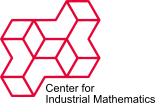WG Discrete Optimization
Administration: Prof. Dr. Daniel Schmand
The Discrete Optimization group develops efficient algorithms for application-motivated mathematical optimization problems. A special focus of the group is the computation of solutions with additional properties. In Algorithmic Game Theory, stable equilibrium states of complex systems with strategically acting agents are studied. In robust optimization, solutions are sought whose quality is robust to a changed initial situation. Typical applications are in traffic planning and optimization, in logistics, and in enery networks and in robotic systems. We work closely in interdisciplinary collaborations with other scientists. In addition to research and teaching we also focus on the transfer of knowledge between university and society. We regularly cooperate with industry, research institutes or schools in the region. We are very happy to be part of the #MOIN project.Algorithmic Game Theory
Many every-day processes can seen as a game between autonomous interacting players, where each player acts stategically in order to pursue her own objectives. Use-cases are distributed systems, auctions, online-markets, resource allocation, traffic routing, and sports. One goal of Algorithmic Game Theory is to analyze the efficiency and existence of equilibria in such games.
Discrete Optimization
In the research area Discrete Optimization, methods, algorithms and software are developed to handle discrete optimization problems. In many cases additional requierements have to be met. Typically, the calculation of an optimal solution should not take too long, solutions need to be robust to changes of the environment and some important data might be unknown. We develop methods to analyze the complexity of the proplem and solution methods that satisfy as many of the desired properties as possible. Application areas include the planning of network and transportation systems.
Online Algorithms
An online algorithm is one that can process its input piece-by-piece in a serial fashion, i.e., in the order that the input is fed to the algorithm, without having the entire input available from the start.
In contrast, an offline algorithm is given the whole problem data from the beginning and is required to output an answer which solves the problem at hand.
In particular, our research group studies variants of stopping problems, where the task is to stop a sequence of observed data at the best possible point(s).
Two New Papers @ CIAC
Our papers 'Network Creation Games with 2-Neighborhood Maximization' (by Merlin de la Haye, Pascal Lenzner, Daniel Schmand and Nicole Schröder) and'On the Price of Anarchy in Packet Routing Games with FIFO' (by Daniel Schmand, Torben Schürenberg and Martin Strehler) has been accepted for publication at CIAC 2025.
New Paper @ ALGOWIN
Our paper 'On the Min-Max Star Partitioning Number' (by Sarah Feldmann and Torben Schürenberg) has been accepted for publication at ALGOWIN 2024.
New Paper @ Games and Economic Behavior
Our paper 'Bicriteria Nash Flows over Time' (by Tim Oosterwijk, Daniel Schmand, and Marc Schröder) has been accepted for publication at Games and Economic Behavior.
Zwei Papiere @ ICALP 2024
Our paper 'Solving Woeginger's Hiking Problem: Wonderful Partitions in Anonymous Hedonic Games' (by Andrei Constantinescu, Pascal Lenzner, Rebecca Reiffenhäuser, Daniel Schmand, and Giovanna Varriccio) has been accepted for publication at ICALP 2024.
Our paper ' Solution Discovery via Reconfiguration for Problems in P' (by Mario Grobler, Stephanie Maaz, Nicole Megow, Amer E. Mouawad, Vijay Ramamoorthi, Daniel Schmand, and Sebastian Siebertz) has been accepted for publication at ICALP 2024.
PC @ WINE 2024
Daniel Schmand has been invited to serve as a PC member at WINE 2024 - The 20th Conference on Web and Internet Economics.
FRICO 23, Eindhoven, Best talk award
Nicole Schröder and Torben Schürenberg attended FRICO 23 in Eindhoven from Aug. 14 - Aug. 18 and each gave a talk. FRICO (Future Research in Combinatorial Optimization) took place for the 26th time this year. 38 PhD students presented topics in discrete mathematics for 30 minutes each. The best talk award at FRICO 2023 went to Torben Schürenberg from University of Bremen for his talk "Hunting an invisible rabbit on an infinite graph in finite time".
Projects: #MOIN, hyBit, MMM, LogDynamics, π³
#MOIN: #MOIN - Modellregion Industriemathematik is a transfer project funded by the federal ministry of education and research. The goal of the project is to bring industrial mathematics in areas of politics, the industry, society and school.
hyBit: Hydrogen is seen as the energy carrier of tomorrow. But the path to an efficient hydrogen economy is complex and requires excellent scientific research. The large-scale hydrogen research project hyBit, coordinated by the university, is now receiving nearly 30 million euros in funding for this purpose. Our group is also a member of the project!
MMM: Minds, Media, Machines is an interdisciplinary network of researchers at the University of Bremen and affiliated institutes within and outside the university. They work together to improve our understanding of intelligence and cognition in autonomous agents, agent teams in the context of mediatized worlds. Our research group is also a part of it.
LogDynamics: Since 1995, the Bremen Research Cluster for Dynamics in Logistics (LogDynamics) has stood for interdisciplinary research in logistics topics and for a correspondingly focused structured international doctoral program at the University of Bremen. LogDynamics contributes to the profile of the excellent and modern University of Bremen in research, transfer and doctoral education in an international environment. Through the associated emergences and synergies, LogDynamics provides Bremen with new impulses and driving forces as a business location.
π³: In the graduate program "π³: Parameter Identification - Analysis, Algorithms, Implementations", PhD students concentrate on the interface between applied mathematics and computer science on questions of parameter identification, which are essentially formulated as high-dimensional minimization problems for suitable functionals.

